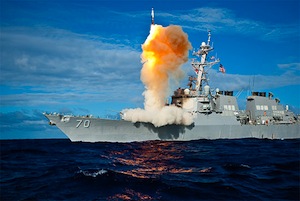U.S. Wasting National Security Funds on Missile Defense
Featured Image
Today's top nuclear policy stories, events, and analysis with excerpts in bullet form.
Stories we're following today - Monday, April 25, 2011:
ANALYSIS: Missile Defense Update 2011: Questions Remain - Lt. General Robert G. Gard for The Center for Arms Control and Non-Proliferation [link]
- The U.S. is engaged in a prolonged, highly expensive and only occasionally successful program to develop a layered, integrated system of systems to defend the homeland, troops and facilities abroad, and some allies from ballistic missile attacks.
- Expenditures for a layered missile defense system of systems continue to consume a disproportionate amount of the national security budget compared with more cost effective defense measures (topping $10 billion in FY’11 and FY’12).
- Funding to deploy the Ground-Based Mid-Course missile defense system to defend the homeland should be reallocated to counter other more likely threats to national security. Research and development on tactical system to defend our troops, installations and allies should continue, and systems should be procured when realistic operational tests demonstrate that they are effective.
US Must Play Lead Role In New Test Ban Treaty - Richard Klass and Robert Dodge in The Nashua Telegraph [link]
- The next logical step to reduce the nuclear weapons threat will be Senate consideration and ratification of the Comprehensive Test Ban Treaty.
- President Ronald Reagan’s Secretary of State George Shultz, Henry Kissinger and President George H.W. Bush’s National Security Adviser Brent Scowcroft have come out strongly in favor of this treaty on national security grounds.
- New Hampshire Sens. Kelly Ayotte and Shaheen have an opportunity to help lead a bipartisan majority to stop the worldwide testing of nuclear weapons and help reduce the risk posed from these weapons of mass destruction.
10 NATO Countries Want More Transparency for Non-Strategic Nuclear Weapons - Hans Kristensen for “Strategic Security” a FAS Blog [link]
- Four NATO countries supported by six others have proposed a series of steps that NATO and Russia should take to increase transparency of U.S. and Russian non-strategic nuclear weapons.
- According to estimates developed by Robert Norris and myself, the United States currently has an inventory of approximately 760 non-strategic nuclear weapons, of which 150-200 bombs are deployed in five European countries.
- The proposal comes as the first phase of NATO’s new Defense and Deterrence Posture Review (DDPR) has begun preparation of four so-called scoping papers on 1) the threat facing NATO, 2) the alliance’s strategic mission, 3) the appropriate mix of military forces, and 4) the alliance’s arms control and disarmament policy.
Iran Says It Has Detected Second Cyber Attack - Ramin Mostafavi in Reuters [link]
- Iran has been targeted by a second computer virus in a "cyber war" waged by its enemies, its commander of civil defense said on Monday.
- Gholamreza Jalali told the semi-official Mehr news agency that the new virus, called "Stars," was being investigated by experts.
- Jalali warned that the Stuxnet worm, discovered in computers at Iran's Bushehr nuclear reactor last year, still posed a potential risk. Some experts described it as the world's first "guided cyber missile," aimed at Iran's atomic program.
MARK YOUR CALENDAR: April 26th, 2011
Mohamed ElBaradei, former director general of the International Atomic Energy Agency, releases his memoir, The Age of Deception: Nuclear Diplomacy in Treacherous Times.
EVENT: Ploughshares Fund Open House [link]
- President Joe Cirincione, Executive Director Naila Bolus, and the San Francisco staff host an open house in Ploughshares Fund's new San Francisco office
- Located at 1808 Wedemeyer Street, Suite 200
- For more information, please contact Samara Dun at 415-668-2244



